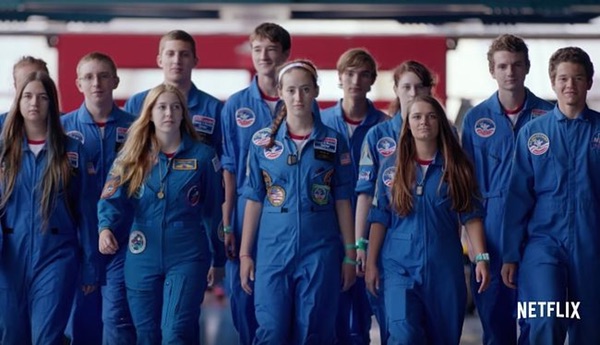Reviews: Mars and The Mars Generationby Jeff Foust
|
| “Making Mars” is almost a condensed version of the series itself, with scenes from the shows intermixed with behind-the-scenes elements and the various talking heads, for those without the attention to go through six hours of programming. |
There will also, though, be some examination of the cultural aspects of Mars exploration. A panel Wednesday afternoon will look at “Media, SciFi, and the Exploration of Mars,” while one Tuesday afternoon will examine the relationship between Mars and Hollywood. That panel will include actors Ben Cotton and Clementine Poidatz, who starred in the National Geographic drama/documentary miniseries Mars last year.
That miniseries is now available on DVD and Blu-Ray for those who missed the series when it aired last fall, or who just want to see it again. That series, of course, has been extensively reviewed here (see “Red zeitgeist: popular entertainment and the settlement of Mars (part 3)”, The Space Review, January 16, 2017). If you liked, or didn’t like, the series when it was broadcast, the discs won’t change your minds.
The Blu-Ray release includes two discs, each with three episodes from the miniseries, plus a third with about two hours of extras. They include “Making Mars,” a 45-minute show about the making of the series and the science and technology of going to Mars. The Mars exploration aspects include a variety of experts, from Neil deGrasse Tyson to Robert Zubrin to astrobiologist Chris McKay. It is almost, in some respects, a condensed version of the series itself, with scenes from the shows intermixed with behind-the-scenes elements and the various talking heads, for those without the attention to go through six hours of programming.
The extras in the Blu-Ray release includes other behind-the-scenes featurettes and interviews. In addition, the extras include “Before Mars,” a half-hour “prequel” about Hana and Joon Seung, the twins from the series, as teenagers in 2016.
Also appearing at the conference Tuesday evening is Abigail Harrison, better known as “Astronaut Abby.” She is not an astronaut, despite the nickname, but rather an “aspiring astronaut” currently in college and who founded a nonprofit organization, The Mars Generation, for those young people who see themselves as the generation that will set foot on Mars.
 |
The Mars Generation is also the title of a documentary, now available on Netflix, that includes Harrison and other young men and women with similar dreams. The film follows a group of them attending Space Camp in Huntsville, Alabama, as they go through a series of exercises and projects. The group—male and female, but nearly all white—has a shared desire to explore Mars, with some even expressing the willingness to die there.
Interspersed with the vignettes of life at Space Camp is a history of NASA’s human spaceflight program, from the beginning of the Space Age through the shuttle program and future plans. The documentary includes interviews with a wide range of people, including science communicators (Tyson, Michio Kaku, Bill Nye), current and former government officials and politicians (former NASA administrator Charles Bolden, former White House science advisor John Holdren, and Sen. Bill Nelson), and current and former astronauts, among others.
| “People say my generation is the Mars Generation, but we’re not at this rate,” said one teenaged Space Camper. |
Much of the documentary follows a familiar trajectory, recounting the Apollo program and the missed opportunity immediately thereafter to move on to Mars, setting back the advance of the space frontier by decades. Jeffrey Kluger, the Time magazine journalist who writes frequently about space, argues in the film that, if we had followed Wernher von Braun’s plan from the late 1960s, we could have had people on Mars in the early 1980s. (Never mind that such plans faced technical and fiscal challenges that made them infeasible on anything like that schedule, had the Nixon Administration elected for some reason to pursue them.) If only, some people in the film lament, NASA had a budget more like it did during the Apollo program.
Then, after a discussion of NASA’s current plans to build the Space Launch System and Orion as part of plans to go to Mars, the film changes course. “We’re building the SLS, but at the rate we’re going it won’t be done until I’m 40 or 50,” lamented one teenaged Space Camper, injecting a dose of fiscal reality or undue pessimism, depending upon your point of view. “People say my generation is the Mars Generation, but we’re not at this rate.”
The last part of the documentary shifts to commercial ventures, in particular SpaceX, as a means of reducing the cost of space access and carrying out Mars plans in cooperation with, or even in place of, NASA. That includes footage from Elon Musk’s unveiling of his Mars mission architecture last year and scenes of Falcon 9 first stage landings (although not the first reuse of a Falcon 9 first stage from March.) It is reminiscent of the first episode of the Mars miniseries, whose documentary segments focused heavily on SpaceX.
Those Space Campers with visions today of walking on Mars in 20 years might well be the Mars Generation—but the same could be said of those who attended Space Camp 10, 20, or 30 years ago: Mars has been the long-term destination for human spaceflight for decades, always just a few decades years away. Former astronaut Don Thomas, interviewed near the end of the film, was pleased that kids today had the same interest in spaceflight as he did as a kid watching the early Mercury flights. In other words, the kids are all right.
Perhaps that’s the lesson of The Mars Generation: that the teenagers of today—Generation Z, as some have named that age cohort—are still interested in space, like the Millennials, Gen Xers, and Baby Boomers that preceded them, despite decades of broken promises of when we would get to Mars. The passion for Mars remains strong, even as the will and ability for humans to actually go there remains uncertain.
